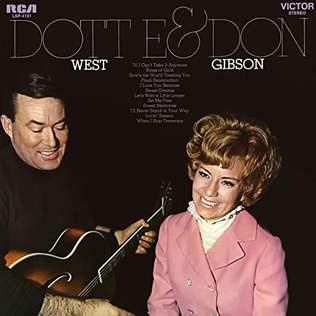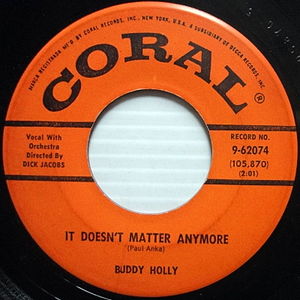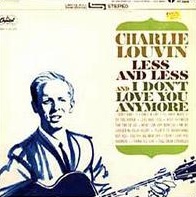Related Research Articles

The Louvin Brothers were an American musical duo composed of brothers Ira and Charlie Louvin. The brothers are cousins to John D. Loudermilk, a Nashville Songwriters Hall of Fame member.

Charles Elzer Loudermilk, known professionally as Charlie Louvin, was an American country music singer and songwriter. He is best known as one of the Louvin Brothers, and was a member of the Grand Ole Opry since 1955.

"Love Don't Live Here Anymore" is a song written by Miles Gregory and originally recorded by Rose Royce. It was produced by former Motown songwriter and producer Norman Whitfield for Whitfield Records. Lead vocals were sung by Gwen Dickey and the song was released as the second single from their third studio album Strikes Again. The song was developed as a result of producer Whitfield's interest to work with Paul Buckmaster, the British arranger and composer. Together they asked songwriter Miles Gregory to write a song for them. Gregory's undergoing medical care for his deteriorating physical health became the inspiration behind the song. "Love Don't Live Here Anymore" incorporated the use of the Pollard Syndrum TwinDrum, and was one of the first songs to effectively use the sound reverbs of the instrument. The song was mainly recorded at music contractor Gene Bianco's house, where Dickey was present during the recording.

Melba Joyce Montgomery is an American country music singer and songwriter. She is known for a series of duet recordings made with George Jones, Gene Pitney and Charlie Louvin. She is also a solo artist, having reached the top of the country charts in 1974 with the song, "No Charge". Born in Tennessee but raised in Alabama, Montgomery had a musical upbringing. Along with her two brothers, she placed in a talent contest which brought her to the attention of Roy Acuff. For several years she toured the country as part of his band until she signed with United Artists Records in 1963.

"I Don't Wanna Go On with You Like That" is a song by English musician Elton John from his 21st studio album Reg Strikes Back (1988), released as the lead single of the album. The track was written by John and his long-time songwriting partner, Bernie Taupin.

Dottie and Don is a studio album by American country music artists Don Gibson and Dottie West. It was released in March 1969 on RCA Victor Records and was produced by Chet Atkins and Danny Davis. The album was a collection of duet recordings between Gibson and West. It was both artists first album of duets to be recorded. Among the songs from the project, "Rings of Gold" became a major hit in 1969.

The singles discography of American singer Patti Page contains 127 singles as a lead artist, seven as a collaboration with other artists, seven for the Christmas music market and 19 other charted songs. Page's singles were released for nearly 20 years on Mercury Records. Her debut release was 1947's "Every So Often". In 1948, Page had her first charting release with "Confess", peaking at number 12 on the American Billboard Hot 100. Four more singles reached the top 20 or 30 on the chart in the forties decade: "Say Something Sweet to Your Sweetheart", "So in Love", "I'll Keep the Lovelight Burning" and "Money, Marbles and Chalk". The latter also reached number 15 on the Billboard Hot Country Songs chart. In 1950, "I Don't Care If the Sun Don't Shine" became Page's first top ten Hot 100 single. It was followed by her first to top the charts called "All My Love (Bolero)". Also in 1950 came the release of "Tennessee Waltz". It topped the Hot 100 for several weeks, while also reaching number two on the Country Songs chart and her first to reach number one in Australia.

"It Doesn't Matter Anymore" is a pop ballad written by Paul Anka and recorded by Buddy Holly in 1958. The song was issued in January 1959, less than a month before Holly's death. "It Doesn't Matter Anymore" reached number 13 as a posthumous hit on the Billboard Hot 100 chart in early 1959, shortly after Holly was killed in a plane crash on February 3, 1959. The single was a two-sided hit, backed with "Raining in My Heart". "It Doesn't Matter Anymore" was Holly's last US Top 20 hit and featured the orchestral backing of Dick Jacobs. It was also successful in the United Kingdom, where it became the country's first posthumous number 1 hit.

Connie Smith is the debut studio album by American country music artist Connie Smith. It was released in March 1965 by RCA Victor and was produced by Bob Ferguson. The album included Smith's debut single, "Once a Day". The song became her signature recording and biggest hit, reaching number one on the Billboard country songs chart.

Just One Time is the sixteenth solo studio album by American country singer Connie Smith, released in June 1971 by RCA Victor. The album was named for the lead single of the same name, which reached the top five of the North American country charts in 1971. The album itself would chart in the top 20 of the American country LP's chart following its release. Additionally, Billboard magazine gave the project a positive reception when reviewing it in 1971.

The Song We Fell in Love To is the twenty-seventh solo studio album by American country singer Connie Smith. It was released in March 1976 on Columbia Records. The album contained ten tracks of material crafted in a country pop style that featured overdubbed vocal harmonies by Smith herself. Two singles were included on the project: the title track and a cover of The Everly Brothers's "(Till) I Kissed You". The latter single became Smith's first top ten American single in several years. The album itself peaked in the top 40 of the American Country LP's chart in 1976.

I Don't Wanna Talk It Over Anymore is the twenty-eight solo studio album by American country singer Connie Smith. It was released in October 1976 and contained ten tracks. The project's name was derived from the title track, which was one of three singles included. Its other single releases included a cover The Everly Brothers's "So Sad " and an original tune called "The Latest Shade of Blue". The title track was the album's most successful single, placing in the top 20 of the American country songs chart. The album received a positive response from Billboard magazine following its release. It was also Smith's final studio project released with the Columbia label.
Darrell Puckett, known professionally as Darrell Clanton, is an American country music artist. In the mid-1980s, he recorded for Audiograph and Warner Bros. Records, charting three singles on the Billboard country charts. The highest of the three was "Lonesome 7-7203," which reached No. 24 on the country charts in 1984.

The discography of American country artist, Melba Montgomery contains 29 studio albums, eight compilation albums, 61 singles, one other charting song and has appeared on five albums. Of her studio albums, 22 are solo releases while seven are collaborative releases. Of her singles, 42 are solo releases while 18 are collaborative. Montgomery collaborated with George Jones on 1963's "We Must Have Been Out of Our Minds", which reached number three on the Billboard Hot Country Songs chart. Together, they recorded several studio albums including What's in Our Heart (1963), which reached number three on the Billboard Top Country Albums chart. The United Artists and Musicor labels issued several more singles by the pair. Among them were the top 25 songs "Multiply the Heartaches" (1965) and "Party Pickin'" (1967). She also collaborated with Gene Pitney during the sixties on the top 20 single "Baby Ain't That Fine" (1965). Both United Artists and Musicor issued several solo studio albums and singles by Montgomery during the sixties also. Among them was the charting single "Hall of Shame" (1963) and the 1967 LP, Don't Keep Me Lonely Too Long (1967).

Less and Less is the debut album by American country music singer Charlie Louvin, released in 1964. The album is titled after Louvin's first two solo singles. Both reached the Billboard Country Singles top 40 chart; "Less and Less" reached number 27 and "I Don't Love You Anymore" peaked at number 4. "See the Big Man Cry" was released as a single in 1965 and reached number 7. The album reached number 6 on the Billboard Country Albums chart.

"If I Could Only Win Your Love" is a song written and first performed in 1958 by The Louvin Brothers and later made a hit by American country music artist Emmylou Harris. Harris and Herb Pedersen sing this as a duet, much like Charlie and his brother Ira sang it originally. It was released in June 1975 as the second single from her album Pieces of the Sky. The song peaked at number 4 on the Billboard Hot Country Singles chart. It also reached number 1 on the RPM Country Tracks chart in Canada.

The singles discography of Connie Smith, an American country artist, consists of 48 singles, one music video and one additional charting song. After signing with RCA Victor Records in 1964, Smith released her debut single in August entitled "Once a Day". The song topped the Billboard Magazine Hot Country Singles chart by November and held the position for eight weeks, to date being the longest running song at number one by a female country artist. The single's success launched Smith into stardom, making Smith one of the decade's most successful female artists. The follow-up single "Then and Only Then" reached #4 on the country singles chart, while its flip side went to #25 on the same chart. All of Smith's singles released between 1965 and 1968 reached the top 10 on the Billboard country songs chart, including "If I Talk to Him", "Ain't Had No Lovin'", and "Cincinnati, Ohio". By 1969 Smith felt highly pressured from her career and cut back on promoting singles. Smith's chart success slightly declined because of this, with songs like "Ribbon of Darkness" (1969) and "Louisiana Man" (1970) only reaching the top 20. Other singles continued to peak within the top 10 including "I Never Once Stopped Loving You" (1970) and "Just One Time" (1971).

The singles discography of Elvis Presley began in 1954 with the release of his first commercial single, "That's All Right". Following his regional success with Sun Records, Presley was signed to RCA Victor on November 20, 1955. Presley's first single with RCA, "Heartbreak Hotel", was a worldwide hit, reaching the No. 1 position in four countries and the top 10 in many other countries. Other hit singles from the 1950s include "Don't Be Cruel", "Hound Dog", "Love Me Tender", "Too Much", "All Shook Up", "(Let Me Be Your) Teddy Bear", "Jailhouse Rock", "Don't", "Hard Headed Woman" and "A Big Hunk o' Love". On March 24, 1958, Presley entered the United States Army at Memphis, Tennessee, and was stationed in Germany. He left active duty on March 5, 1960.

The singles discography of English singer Cliff Richard consists in excess of 200 singles, of which 159 singles have been released in the UK in varying vinyl, CD, cassette and digital formats. Listed alongside the UK singles in the discography below are a further 20 singles which were released in other territories, as well as 22 singles which were sung in German and only released in German-speaking countries.

Melba Montgomery is a self-titled studio album by American country artist, Melba Montgomery. It was released in October 1973 via Elektra Records and contained 12 tracks. The disc was Montgomery's first with the Elektra label and eighteenth album overall. Material on the album mixed both uptempo numbers with ballads. New selections along with cover songs were included. The album included two singles. The first single, "Wrap Your Love Around Me", reached the top 40 of the American country songs chart in 1973. The album received positive reception from Billboard magazine following its release.
References
- ↑ "Charlie Louvin singles". Allmusic . Retrieved 31 March 2011.
- ↑ "RPM Country Singles for September 28, 1964". RPM . Retrieved 31 March 2011.